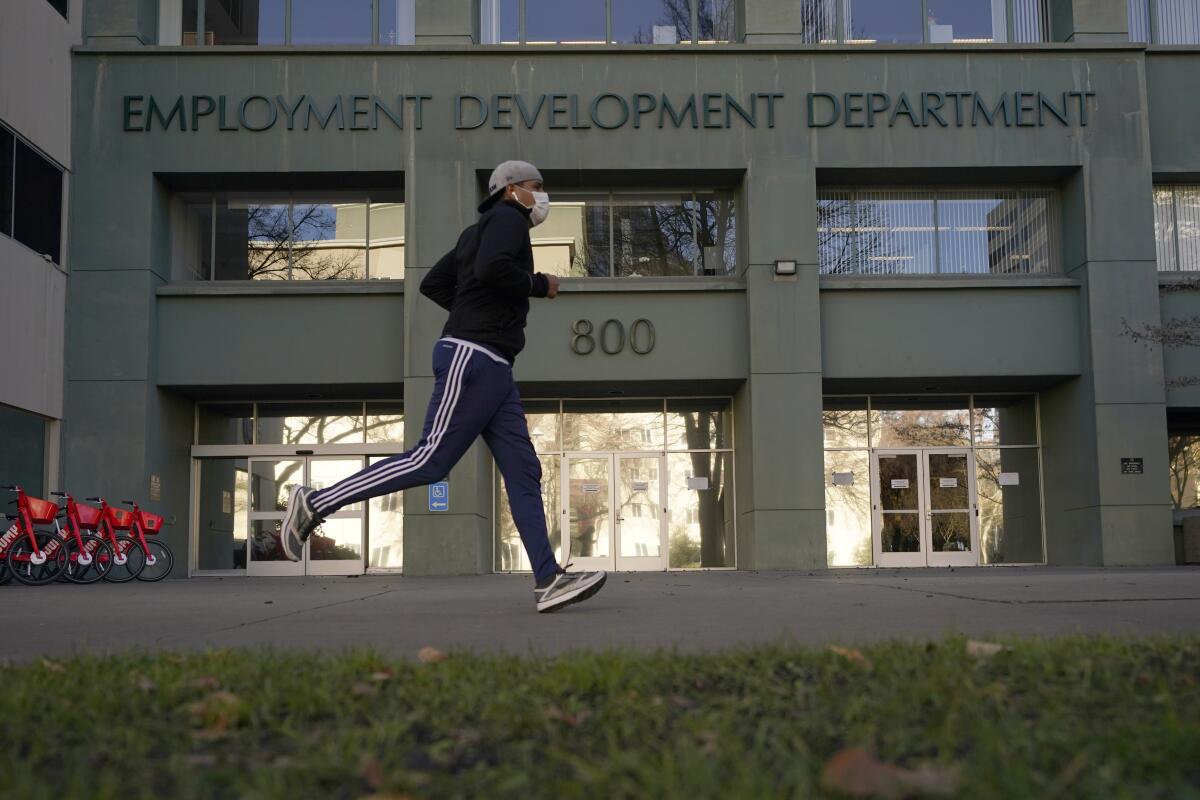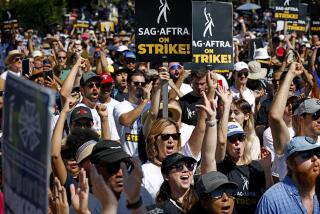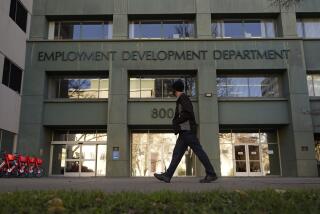Editorial: A year ago the state’s unemployment agency was a mess. It’s better, but still struggling

It has been 16 months since the COVID-19 pandemic forced businesses across the state to cut back or close, throwing millions of Californians out of work — and into the arms of the overwhelmed and unprepared state Employment Development Department, which administers unemployment benefits.
Now that pandemic restrictions have been lifted and job openings are so plentiful that businesses are offering signing bonuses and premium pay to lure workers, you’d think that the stress on the unemployment system would have diminished — especially after all the urgent action taken by the governor and state officials, the audits, the fraud investigations and legislative reform proposals.
Yet the crisis at EDD continues, if less acutely than last year. As of the week of June 26, the latest period for which there are data, the EDD reported about 217,000 claims in its backlog — not counting about 900,000 pending claims that have yet to be certified by the person who filed them. Throughout much of 2020, the claims backlog was more than 1 million. And midway through 2021, more than 90% of the calls to the EDD call centers were going unanswered, compared with more than 99% in 2020. Currently, it it takes the typical caller 11 tries to reach a human.
It’s progress, to be sure, but still unacceptable. These aren’t just numbers; they are people who have lost their jobs and the income that goes with it.
We know bureaucracies move slowly, and it takes many months to hire and train the hundreds of new workers the EDD needs. But given the intense focus on this one agency over the last year and the money and resources thrown its way, it was reasonable for the public to expect that one year later those problems would have been largely fixed. After all, during a much shorter period of time the state was able to administer more than 41 million doses of COVID-19 vaccine, inoculating nearly 60% of its population. But there are still too many reports of people caught in unemployment limbo, unable to reach the department to verify their claims and desperate for the benefits for which they are eligible.
To be fair, no state or federal agency was prepared for a crisis like the COVID-19 pandemic. As governments imposed stay-at-home orders and businesses swiftly curtailed their operations, Californians lost jobs in staggering numbers — putting a tremendous strain on a bureaucracy already hampered by outdated technology and staff shortages, and which had also shuttered its workplace. In California alone, about 23 million claims have been filed since March 2020 and $155 billion paid out.
And Congress made the situation all the more challenging by extending unemployment benefits to gig workers, contractors and others in the workforce who don’t typically qualify for benefits. To deal with this, the agency suspended some of the verification requirements, which opened the door to fraudsters who have bilked the system for as much as $30 billion.
State legislators are fed up with the lingering problems, too. When their constituents can’t get through to call centers, they flood the phone lines of their local legislators hoping for assistance. That’s why it’s no surprise that reform proposals have bipartisan support in the Legislature.
Some of those bills have stalled, but others are still in play, including Assembly Bill 56 by Assembly members Rudy Salas (D- Bakersfield) and Jim Patterson (R-Fresno), which would implement some of the anti-fraud measures suggested by the state auditor. Among its provisions, the bill would create a fraud prevention unit that would start tackling the backlog of suspected fraud cases as soon as possible.
The governor’s office is also considering devoting more resources to help the EDD get through its backlog of new claims for unemployment benefits and to stop fraud.
We are glad that lawmakers are responding to the widespread concerns about the enduring problems at the agency, and we urge them to move quickly. Californians can’t wait another year for the crisis at the EDD to be resolved.
More to Read
A cure for the common opinion
Get thought-provoking perspectives with our weekly newsletter.
You may occasionally receive promotional content from the Los Angeles Times.










